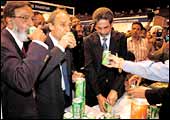|
Yes, yes, and yes (and we couldn't
find a dissenting view despite looking long and hard for one). Between
January 2003 (Rs 47.99 to the dollar) and March 2004 (Rs 45.24 to
the dollar on March 3), the rupee has gained 5.7 per cent. And foreign
exchange analysts believe it will gain another 3 per cent over the
next six months. Investment bank JP Morgan sees the exchange rate
at Rs 43.80 to the dollar by September 2004. The logic: foreign
exchange inflows will increase, especially with India Inc. taking
advantage of relaxed borrowing norms to tap overseas sources of
funds. And with the dollar continuing to weaken against other currencies,
things will likely stay that way for some time.
-Roshni Jayakar
MOBILITY
A Notebook On Every Desktop?
 That's
how it looks. In 2003, the portable computer (notebook) market in
India grew 72 per cent, from 48,666 units to 83,724 units. Reduction
in import and excise tariffs (from 39 per cent to 19 per cent and
16 per cent to 8 per cent respectively), growing demand from a mobile
workforce, and the complete absence of a grey (read: smuggled) market
are the three reasons for this, although as Shuchi Sarkar, Head,
Marketing, Personal Systems Group, hp puts it, "the market
is growing on a small base". Alok Ohrie, Vice President, Personal
Computing Division, IBM India (the company has just launched notebooks
priced below the psychological barrier of Rs 50,000), is more sanguine,
pointing to the global desktops:notebooks ratio of 2:1 as evidence
of future growth. The corresponding Indian ratio is 30:1. That's
how it looks. In 2003, the portable computer (notebook) market in
India grew 72 per cent, from 48,666 units to 83,724 units. Reduction
in import and excise tariffs (from 39 per cent to 19 per cent and
16 per cent to 8 per cent respectively), growing demand from a mobile
workforce, and the complete absence of a grey (read: smuggled) market
are the three reasons for this, although as Shuchi Sarkar, Head,
Marketing, Personal Systems Group, hp puts it, "the market
is growing on a small base". Alok Ohrie, Vice President, Personal
Computing Division, IBM India (the company has just launched notebooks
priced below the psychological barrier of Rs 50,000), is more sanguine,
pointing to the global desktops:notebooks ratio of 2:1 as evidence
of future growth. The corresponding Indian ratio is 30:1.
-Venkatesha Babu
PARTY
Women Aboard!
 |
| 'BT's most powerful women' club: All
aboard Haveli of Seahorse |
Date
February 21, 2004 between 5 p.m. and 8 p.m.
The place
The Piramals' Haveli of Seahorse, an old Arab dhow (registered in
1882), on the Arabian sea.
The occasion
A party to honour BT's 25 most powerful women in Indian business
(see BT, November 23,2003).
The host
Dr Swati Piramal, head of strategic alliances, Nicholas Piramal.
She and Kalpana Morparia, Deputy Managing Director, ICICI Bank (both
among the 25), conceived the idea of forming a BT's most powerful
women club, while on flight from Mumbai to Delhi.
Who were there
Nine of the BT's powerful women in business made it to the dhow:
Vinita Rai, Simone Tata, Kalpana Morparia, Lalita Gupte, Chanda
Kochhar, Renuka Ramnath, Shikha Sharma and Meenakshi Madhvani. Also
present were other women of note.
What they did
Told stories, blew balloons, sang, and danced the Salsa.
The Food
Home-cooked Gujarati, Thai and Continental.
The Club's next party
ICICI Towers later this year. The host: ICICI Bank's five powerwomen.
-Roshni Jayakar
Cheers
To It
India and Pakistan look to boosting their trade
relations.
 |
| P-offering: Union Minister
Arun Shourie takes a sip of "Pakola" |
For two countries divided only by
a porous border and bad politics, India and Pakistan are rather
surprising trade strangers. Last year, their trade amounted to a
minuscule $262 million (Rs 1205.2 crore), which is less than a fifth
of India's trade with Bangladesh. Cross-border business had picked
up in 1998-99, ahead of Prime Minister Atal Bihari Vajpayee's historic
bus trip to Lahore, but quickly fell when the Kargil war broke out.
With renewed hope in the air, businessmen from both countries
see a new opportunity to boost trade. Federation of Indian Chambers
of Commerce and Industry and its Pakistani counterpart FPCCI recently
organised a "Made in Pakistan" trade fair in New Delhi
to showcase the estranged sister country's prowess in textiles and
agriculture (The star of the show, however, was Pakola, a Pakistani
soft drink that found several takers at the fair). FICCI President,
Yogendra Modi, believes trade can help bridge the political divide.
"There is a lot both countries can offer each other, and trade
can easily reach $10-12 billion (Rs 46,000 crore-Rs 55,200 crore)
within five years," he believes. While FPCCI's Vice President
Sheikh Maqbool Ahmed agrees with Modi's assessment, some others
seem less sanguine. "Right now the mood is positive, but who
knows what might happen tomorrow," says Arshad Alam, Vice President,
FPCCI. "We cannot plan long term on a shaky foundation,"
he says. Indeed, since expecting trade to reinforce the foundation
may be a bit unrealistic at this juncture.
-Kushan Mitra
 |
| Manish Goenka, Director, Emami
Group : Cashing in on AB's selling prowess |
BRAND
Emami Whips Up A Super Star
It's one of the most hyped endorsement
deals in recent times. Emami has signed on Big B as the brand ambassador
for an all-time high price. "Negotiations, which had been carrying
on for a month, culminated in a deal on March 3," reveals R.S. Agarwal,
co-Chairman, Emami Group, without disclosing the fee being paid
to super star Amitabh Bachchan. For Emami, which has relied on star
power to sell its range of cold cream and cosmetics (previous ambassadors
have included Madhuri Dixit and Juhi Chawla, among others), Bachchan
should be the crowning glory.
-Arnab Mitra
DASH
BOARD
 A A
ONGC's Subir Raha has reason to cheer: His company's IPO was subscribed
in just 11 minutes. That's quite a sequel to being the most valuable
company in India.
 D D
More Bollywood-reps sign on with the political parties. Who gets
a D? The stars (or have-been ones)? The parties? We think it must
be the poor voters who have to listen to star-speak.
|
